
Linkbox med baggrund og materialer til debatten om fascisme og anti-fascisme.
Marts 2012. Revideret oktober 2020.
Indhold
Fascisme
Leksikale mv.
Leksikon.org
Denstoredanske.dk
Faktalink
- Højreekstremisme og nynazisme (2012)
Betalingssite, som er gratis tilgængelig enten på dit lokale bibliotek eller på din hjemme-pc efter tilmelding på biblioteket.
Wikipedia
- Fascisme. Artikel på dansk.
- Fascisme. Artikel på norsk.
- Fascism. Artikel på engelsk.
- Neo-fascism. Artikel på engelsk.
Marxists Internet Archive
- Glossary of terms: Fascism
- F is for Fascism. By Weyman Bennett (Socialist Review, Issue 319, November 2007)
“Fascism is so often used as an insult that any real analysis of its specific meaning is often obscured.” - Bookwatch: Understanding fascism. By Chris Bambery (International Socialism, Issue 63, Summer 1994, p.163-178). Review essay of the current literature about fascism.

Sites
Marxists Internet Archive
- Marxists on Fascism
“Index to the Writings of Antonio Gramsci, Leon Trotsky, Georgi Dimitrov and James Cannon on the rise of Fascism in Italy, Germany, France and Spain in the 1920s and 30s.”
Marxistarkiv.se
Klassiske tekster
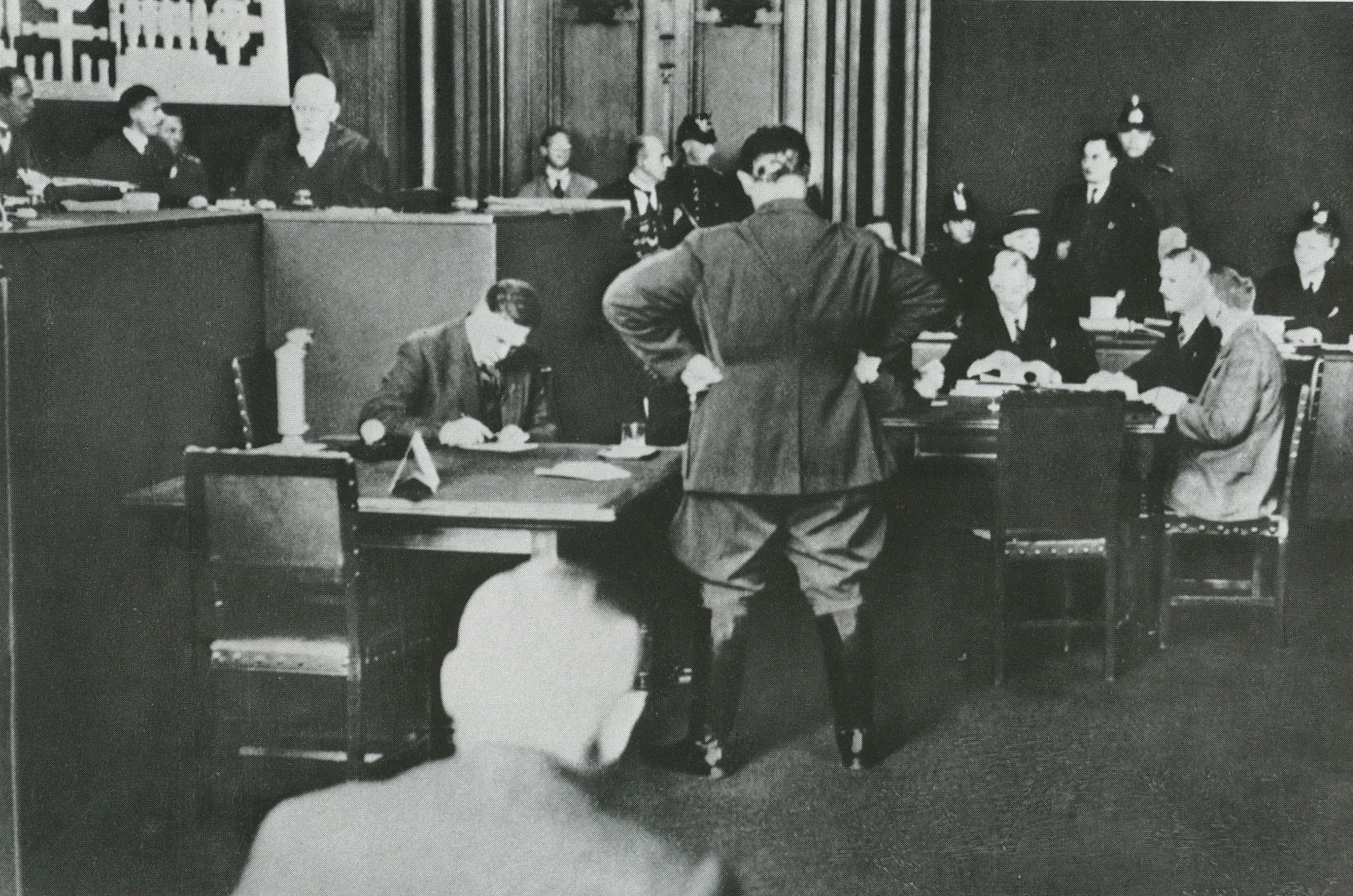
Georgi Dimitrov: Fascismen er fjenden (Kbh., Tiden, 1972, 124 s.). Taler holdt på Kominterns 7. kongres, august 1935.
Uddrag fra bogen:
- Kampen for arbejderklassens enhed mod fascismen [i.e. Fascismens klassekarakter] (s.24-27) (Leksikon.org)
- Fascismen og Arbejderklassen (s.23-38) (PerBenny.dk)
- Arbejderklassens enhedsfront mod fascismen (s.39-77) (PerBenny.dk)
Se også Tidslinjen 25. juli 1935 om Kominterns 7. kongres (Socialistisk Bibliotek)
Daniel Guerin: Fascism and Big Business (New York, Monad Press, 1939/1993, 318 p.)
Uddrag fra bogen mv:/excerpts etc: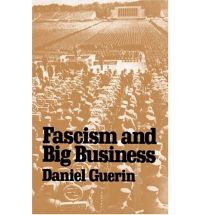
- Fascism och storfinans (pdf). Hele bogen online i svensk oversættelse (Marxistarkiv.se, 2014, 182 s.)
- Summary and quotation by Wade Tillett (The Mail Archive, Nettime, 3 Feb 2004). Summary of chapter 9: Fascism in power: economic policy.
- Excerpt from the book (New International, Vol.4, No.10, October 1938, p.297-300)(on Marxists Internet Archive; Daniel Guérin Archive)
- Fascism and Socialism (Fourth International, Vol.6 No.9, September 1945, p.269-273). Daniel Guerin’s preface to the French edition of the book.
Anmeldelse: Friends at the top. Review by Lindsey German (Socialist Review, Issue 174, April 1994)
Se også personlisten om Daniel Guerin (Socialistisk Bibliotek)
Frank Ridley: Fascism: What Is It? (London, Freedom Press, 1941)
Contents: The Science of Counter-Revolution – The Rise of Fascism – What is Fascism? (Fascism and the Totalitarian State) – Fascism in England – The Future of Fascism.

Leon Trotskij: Hvad er fascisme – og hvordan kan den bekæmpes (1930-34) (Socialistisk Arbejderforlag, 1993, 77 s.; online på Marxisme.dk)
“De første fem artikler er skrevet ud fra kampen mod nazismen i Tyskland; de sidste to ud fra kampene i Frankrig 1934 …”
Leo Trotsky: The Rise of Hitler and the destruction of the German Left (Marxists Internet Archive)
“A complete collection of Trotsky’s writings on Germany covering the years 1930 through 1940.”
See Ernest Mandel: Trotsky’s theory of fascism (1968) (IIRE, International Institute for Research and Education, 3 May 2022)
Alfred Rosenberg: National Socialist aesthetician (1934). By Georg Lukacs (1934)
(George Lucas Archive/Marxists Internet Archive)
“”Rosenberg’s voluminous book The Myth of the Twentieth Century is the most important – also on issues of art – creative work of German fascism to this day.”
PS Alfred Rosenberg var nazistisk ‘chefideolog’ og medansvarlig for folkemordet på især jøder i Østeruropa (henrettet ved Nürnberg krigsforbryderdomstolen i 1946), ikke at forveksle med Arthur Rosenberg (1889-1943), nedenfor, tysk kommunist og historiker.
Arthur Rosenberg: Fascism as a mass-movement (pdf) (Historical Materialism, Vol.20, No.1, 2012, p.144-189; online at South Asia Citizens Web). See also translator’s Jairus Banaji’s Introduction (p. 133-143)
“Arthur Rosenberg’s remarkable essay, first published in 1934, was probably the most incisive historical analysis of the origins of fascism to emerge from the revolutionary Left in the interwar years.”
På svensk: Fascismen som massrörelse (pdf) (Clartés Bokförlag, 1935, 46 s., online på Marxistarkiv.se)
August Thalheimer: On Fascism (What Next!: Marxist Discussion Journal)
“This piece was originally written in 1928 as a policy document for the Communist International, from which the author was expelled soon afterwards because of his opposition to the Comintern’s then ultra-left policies. It was published in 1930.”
På svensk på Marxistarkiv.se (pdf)
Clara Zetkin and the struggle against fascism. By John Riddell and Mike Taber (International Socialist Review, Issue 107, Winter 2017-18, p.109-121). “The following article is the introduction to a newly-published collection Fighting Fascism: How to Struggle and How to Win by the German Marxist Clara Zetkin (Haymarket Books, 2017, 86 p.). På norsk: Clara Zetkin og kampen mot fascismen (Gnist: Marxistisk Tidsskrift, nr.2, 2018). See review by Elizabeth Schulte: The roots of fascism and the seeds for its defeat (SocialistWorker.org, November 30, 2018) + review by Héctor A. Rivera: The struggle against Fascism: Lessons from the past (Marxist Essays and Commentary, June 7, 2020). Se også Clara Zetkin: Kampen mot fascismen (pdf) (Marxistarkiv.se, 2. oktober 2019, 21 s.).
Nyere tekster (1945- )
På skandinavisk:
Hvad er fascisme? Af Scott Cooper (Socialistisk Information, 5. februar 2021)
“Det voldelige angreb fra den yderste højrefløj på Capitolbygningen i Washington den 6. januar har kaldt fascismens spøgelse frem. Men hvad indeholder begrebet fascisme? Marxismen tilbyder et svar.”
Hvordan stoppes den snigende fascisme? Af Neil Faulkner (Socialistisk Information, 27. december 2021)
“Det autoritære højre – et forstadie til fascismen – er på hastig fremmarch, godt hjulpet på vej af den globale kapitalismes krise, COVID-19, klimaforandringerne og frygten for migranter og flygtninge. Venstrefløjen er usikker på, hvordan fascisme skal stoppes.”
Borgerskabet og fascismen. Af Søren Becher (Magasinet Arbejderen, nr. 3, juli 2021, s. 4-9)
“For at kunne inddæmme og nedkæmpe fascismen må vi kende dens indhold, dybde og virkemidler. Hvordan definerer vi fascismen i dag og hvordan ser vi på dens historiske rødder?”
Fascismens nye ansigter. Af Nicolas Allen og Martín Cortés (Soldaritet.dk, 18. maj 2019)
“… den voksende højrefløj er forskellig fra det 20. århundredes fascisme på afgørende områder. Det understreger Enzo Traverso, der underviser i historie på Cornell University, i dette interview fra Jacobin Magazine 2. april [i.e. 4. februar].”
Det yderste højre: et globalt fænomen (Solidaritet.dk, 26. marts 2019)
“Michael Löwy kortlægger den ekstreme højredrejning som globalt fænomen … Enzo Traverso bruger begrebet ‘post-fascisme’, som kan være et nyttigt begreb, fordi det både beskriver kontinuitet og forskel fra fortidens fascistiske strømninger.”
Hvordan svarede socialisterne på fascismens opståen? Af John Riddell (Socialistisk Information, 12. januar 2019)
“Den følgende tale blev holdt den 21. juli 2018 på et todagesseminar på York University med titlen ‘Historiske perspektiver på enhedsfronter mod fascismen og det ekstreme højre’.”
Hvad er fascisme? Af Marie Frederiksen (Revolution, 22. januar 2018)
“Ikke alt, der er reaktionært og højreorienteret, er fascistisk. For at kunne kæmpe mod et fænomen er det nødvendigt at vide, hvad det er, og hvad det ikke er.”
“… en kontinuitet blandt fascistiske bevægelser fra mellemkrigstidens politiske kultur og helt frem til i dag.” Scroll ned.
“Denna artikel behandlar främst … vad som är utmär-kande för fascism och fascistiska rörelser. Artikeln tar speciellt upp den akademiska (borgerliga) fascismforskningen, med utblickar mot den svenska debatten. Därvid berörs även höger-extremism i vidare bemärkelse.”
Fascismen i teori og praksis. Af Hickory (Brand, nr.5, 1997). Oversat fra svensk af Fynske AntiFascister i 2001.
“Som politisk bevægelse adskiller fascismen sig fra andre politiske bevægelser. Den udmærker sig ved sit valg af strategi, den ideologiske indretning, den sociale basis og forholdet til de etablerede magtstrukturer.”
Debatt om fascism och korporatism (pdf) (Zenit, nr.16 + nr.17, 1970; online på Marxistarkiv.se)
Innehåll: Bernt Kennerström: Fascismen som borgarklassens självförverkligande; Jörn Svensson: Var Hitler verkligen fascist?; Bernt Kennerström: Replik om fascism och korporativism. Debat om Komintern-definitionen og modstand mod fascisme – og forholdet mellem former for borgerlig diktatur og fascisme-definitoner. Med referencer.
In English:
The Anatomy of Fascism. By Robert O. Paxton (Alfred A. Knopf, 2004, 322 p.; online at Libcom.org)
“What is fascism? Many authors have proposed definitions, but most fail to move beyond the abstract. The esteemed historian Robert O. Paxton answers this question for the first time by focusing on the concrete: what the fascists did, rather than what they said.”
Fascism: Theory and Practice (pdf). By Dave Renton (Pluto Press, 1999, 150 p.)
“The book surveys the history of modern fascism in Europe, from its prewar origins up to the present day. David Renton examines the Marxist response to fascism in the age of Hitler and Mussolini and the writings of political thinkers such as Trotsky, Thalheimer and Gramsci, as well as more recent European theorist such as Miliband, Mason and Poulantzas.”
Nazi Billionaires by David de Jong: How Hitler’s financiers are still in business. By Ela Maartens, Verena Nees (World Socialist Web Sites, 1 November 2022). Review of David de Jong, Nazi Billionaires: The Dark History of Germany’s Wealthiest Dynasties (Mariner Books, 2022, 400 p.)
“De Jong gives a detailed and well-researched account of the intimate involvement of some of Germany’s largest business dynasties with the National Socialists (Nazis) and shows how, after the war, they were able to continue amassing wealth, retain decisive influence in business and financial spheres, and even resume the financing of fascist tendencies.”
Marxism and Fascism. By John Molyneux (Irish Marxist Review, Vol.10, No.30, 2021)
“This article does not attempt to be an exhaustive survey of the Marxist literature on fascism, which is vast. Rather it is an overview of how the Marxist analysis of fascism was developed with a focus on the writings of Leon Trotsky …”
Fascism: History and Theory. By Luigi Hay (RS21, 25 October 2020). Review of David Renton, Fascism: History and Theory (Pluto Press, 2020, 192 p.)
“David Renton has updated and rewritten this book, originally published in 1999, at a time when the far right of politics seems in the ascendancy.” See extract: The lessons we need to learn from Europe’s struggle against Fascism (Jacobin, September 29, 2020).
The Nazis weren’t socialists — they were hypercapitalists (Jacobin, August 26, 2022). An interview wirh Ishay Landa.
“Right-wingers love to insist that members of Adolf Hitler’s party were socialists. But Nazism’s real economic policies upheld hypercapitalist principles rooted in social Darwinist ideas about the value of human life. They weren’t socialists at all.”
Neoliberal capitalism implodes: global catastrophe and the far right today. By Alex Callinicos (International Socialism, Issue 170, Spring 2021, p.35-70)
“Unlike many other leftist interpretations of the rise of the far right today, my aim is to understand this as a global phenomenon.”
No, the nazis were not socialists. By Scott Sehon (Jacobin, October 9, 2020)
“The idea that the Nazis were socialists is transparently absurd. Unfortunately, it’s also an idea that prominent figures on the Right like Sen. Rand Paul have taken up. So let’s all say it together now: no, the Nazis were not socialists. They were, in fact, committed anti-socialists.”
The rise of the Right (Monthly Review, Vol. 71, No.5, October 2019)
Farooque Chowdhury interviews John Bellamy Foster: “The interview is mainly concerned with the historical conditions associated with the rise of new far-right movements of a broadly neofascist character.”
Fascism in Europe today. By Mark L. Thomas (International Socialism, Issue 162, Spring 2019, p.27-63)
“It is necessary to differentiate within the broader picture of the far right’s rise and to identify a more defined fascist current within it. This requires an understanding of fascism and how it has adapted to the conditions of contemporary capitalism.”
What is different about today’s far right? By David Renton (International Socialist Review, Issue 112, Spring 2019, p.78-91)
“It examines three aspects of the emerging right: first, the international ties between different far-right groups; second, the recurring alliance between parts of the mainstream right and the far right; and third, the relative marginalization of fascists within the right.”
Fascisms old and new. By Nicolas Allen og Martín Cortés (Jacobin, 4 February 2019). An interview with Enzo Traverso about his book, The New Faces of Fascism (Verso, 2019, 208 p.)
“The rise of Bolsonaro in Brazil, Trump in the US, and the far right throughout Europe has the word ‘fascism’ on everyone’s lips. But that rising Right is distinct from twentieth-century fascism in key ways.” See book review by David Gilchrist (Socialist Review, Issue 445, April 2019). The article in Danish: Fascismens nye ansigter (Soldaritet.dk, 18. maj 2019).
The political economy of Fascism. By Louis Proyect (CounterPunch, October 27, 2017)
“Donald Trump is simply the latest manifestation of the neoliberal turn that took root in Reagan’s presidency. It has nothing to do with fascism …”
What is Fascism? And is it an imminent threat today? By Rob Sewell (In Defence of Marxism, 18 May 2017)
“While we recognise the threat from the right and mobilise to oppose it, we refuse to engage in scaremongering about the ‘imminent danger’ of fascism, which is complete nonsense.”
The political culture of Fascism (Historical Materialism, Blog, 19 February, 2017)
“Jairus Banaji discusses fascism and its three best thinkers of the left, Rosenberg, Reich, and Sartre.” Se above Arthur Rosenberg, Fascism as a mass-movement (1934).
After fascism, what? (RS21: Revolutionary Socialism in the 21st Century, December 8, 2016)
“David Renton discusses whether previous definitions of ‘fascism’ fit with the world we see today.” See also Dave Renton: What is fascism? (ibid., January 11, 2017).
Hitler wasn’t inevitable. By Marcel Bois (Jacobin: Reason in Revolt, 25 November 2015)
“The 70th anniversary of the Nuremberg Trials is cause to reflect on the forces that failed to halt Nazism’s rise.”
The two faces of fascism (Socialist Worker, Issue 2301, 1 May 2012)
“Fascists use the street and the ballot box to push their agenda, writes Weyman Bennett, and we need to fight them on both fronts.”
The changing face of racism. By Richard Seymour (International Socialism, Issue 126, Spring 2010, p.65-94)
“In a major article Richard Seymour explores the roots of contemporary racism, seeking to establish what is really new and distinctive about the prevailing forms of prejudice.”
The bourgeois origins of Fascist repression. By Douglas W. Greene (Socialism and Democracy, Vol.22, No.2, July, 2008, p.108-120)
Review of Robert Paxton, The Anatomy of Fascism (Penguin, 2004)
“The term ‘fascism’ conjures up images of jackbooted thugs, swastikas, and a perverse love of violence. Politicians constantly denounce opposition policies as fascist or totalitarian. Fascism is a word often uttered but little understood. Robert Paxton’s recent book puts the term back in historical context.”
Two ways of looking at Fascism. By Matthew N. Lyons (Socialism and Democracy, Vol.22, No.2, July 2008, p.121-156)
“This essay is intended to challenge the prevailing view among U.S. leftist organizations that fascism equals a tool of capitalist repression … Fascism is better understood as an autonomous right-wing force that has a contradictory relationship with capital and that draws mass support largely by advocating a revolution against established values and institutions.”
See also Matthew N. Lyons: Is the Bush Administration Fascist? (New Politics, Vol.11, No.22, Winter 2007, p.19-25)
What is fascism? By Jim Wolfreys (International Socialism, Issue 112, Autumn 2006, p.189-195). Review of Michael Mann, Fascists (Cambridge University Press, 2004), and Robert Paxton, The Anatomy of Fascism (Penguin, 2004)
“Robert Paxton … offers the most authoritative and convincing challenge to the prevailing trends of post-war studies of the subject. For this reason alone, it is the most important work on fascism of the past 20 years … [the] emphasis on what fascists do, rather than what they say, is also present in Michael Mann’s detailed survey of European fascism. He deals bluntly with the fashionable academic preoccupation with fascism’s ”˜mythic core’.”
The physiology of barbarism. By Jim Wolfreys (International Socialism, Issue 83, Summer 1999, p.147-154). Review of of Donny Gluckstein, The Nazis, Capitalism and the Working Class (Bookmarks, 1999)
“Donny Gluckstein has provided us with an outstanding analysis of the Nazi phenomenon. In its discussion of the Nazi leadership and its anti-Semitism, its analysis of the relationship between the Nazi regime, capitalism and the ruling class, and in its assessment of the aims and actions of both supporters and opponents of Nazism … sets it out as a model for a dialectical understanding of fascism.”
Towards a Marxist theory of Fascism. By Dave Renton (Dkrenton.co.uk, 1997; online at Internet Archive)
“The idea of this paper is to outline a materialist way of looking at fascism, which is concerned as much with what fascism did as with what it said. This theory will be developed through an analysis of what Marxists have actually said about fascism.”
See also Fascism: links to recent articles looking at the history of fascism and anti-fascism, or the threat posed by far-right parties in recent years.
Fascism and neofascism. By Louis Proyect (Marxmail.org, 1996-97)
Contents: 1: The Eighteenth Brumaire and Fascism; 2: Trotsky on Bonapartism and Fascism; 3: Michael Mann on Fascism; 4: Nicos Poulantzas on Fascism; 5: Deleuze/Guattari on Fascism; 6: Tom Watson; 7: Pat Buchanan and American Fascism.
What is Fascism? By Matthew N. Lyons (Political Research Associates, December 12, 2016/1997)
“To understand what fascism has encompassed as a movement and a system of rule, we have to look at its historical context and development – as a form of counter-revolutionary politics …”
Hope against the Holocaust. By Alex Callinicos (International Socialism, Issue 67, Summer 1995, p.97-108). Review of Tim Mason, Social Policy in the Third Reich (Berg, 1993, 464 p.) + Hermann Langbein, Against All Hope (Constable, 1994, 480 p.)
“Two myths: One is that the National Socialist regime was supported by the German working class. The other is that the Jews marched meekly into the gas chambers, not resisting their extermination. I call these myths because the two very different books under review here refute these ideas.”
Nazism and the working class. By Sergio Bologna (Common Sense, No.16, 1996, p.15-56; online at Libcom.org)
“Italian autonomist Sergio Bologna discusses the rise of Nazism and its relationship to the German working class.”
Silencing the Nazi threat. By Paul Foot (Socialist Review, No.175, May 1994, p.9–11; online at Marxists Internet Archive). “Do fascists have the same right to free speech and organisation that other political parties do? … allowing them such freedom only results in the destruction of democracy and free speech for everyone else.”
Fascism: An essay. By Chip Berlet (PublicEye.org, September 1992)
“This article is adapted from the author’s preface to Russ Bellant’s book Old Nazis, the New Right, and the Republican Party, co-published by South End Press and Political Research Associates.”
Nazisterne kan stoppes. Af Chris Bambery (Internationale Socialister Forlag, 1993, 45 sider; på Marxisme Online)). Oversættelse af Killing the Nazi Menace (Socialist Workers Party, London 1992). Om fascismen historisk, erfaringerne fra 30’erne og euro-fascismen i 80’erne. (P.t. not online in English).
Aldrig mere fascisme! (1980). Af Colin Sparks (Internationale Socialisters Forlag, 1993, 65 sider; på Marxisme Online). Oversættelse af Never Again! The hows and whys of stopping fascism (Bookmarks, London 1980). Mest om fascismen historisk, og de historiske erfaringer med forskellige anti-fascistiske strategier. (P.t. not online in English).
The workers’ opposition in Nazi Germany. By Tim Mason (History Workshop Journal, No.11, Spring 1981, p.120-137; online at Libcom.org)
“… the political role of the working class in the Third Reich was not confined to [the] heroic and tragic underground struggle. Alongside the resilient agitation and organisation of the illegal groups, economic class conflict re-emerged in Germany on a broad front after 1936.”
Fascism and the working class. Part 1: The German experience. By Colin Sparks (International Socialism, Issue 2, Autumn 1978, p.41-69)
“In this article, I want to examine rather more closely what we mean by considering fascism as ‘petit bourgeois’, and to examine the relationship between the German Nazis and the working class.”
See also Part 2: The National Front today (Issue 3, Winter 1978/1979, p.17-38)
National Socialism and the working class, 1925-May, 1933 (pdf). By Tim Mason (New German Critique, No.11, Spring 1977, p.49-93; online at Libcom.org)
“A proper perspective for the analysis of class relationships in Germany after 1933 can be gained only by first outlining the development and social composition of the national socialist movement before the seizure of power and by reconstructing the process which led to the destruction of working class organizations in 1933.”
Fascism in Germany: How Hitler Destroyed the World’s Most Powerful Labour Movement. Vol. 1-2. By Robert Black [i.e. Robin Blick] (Steyne Publications, 1975, [1288] p.; online at Marxists Internet Archive)
“Fascism in Germany is at the same time a highly polemical and a scholarly work. It is these two qualities which make it indispensable reading for socialist and students of German history alike.”
Antifascisme
Leksikalt
Antifascisme (Wikipedia.dk)
Dansk Wiki-artikel med links til norske, større tyske og engelske artikler, tynde, men en del links.
Sites
Højre ekstemisme (Demos)
Tema med artikler om DNSB, Dansk Front, White Pride og enkeltsager.
Antifascistisk Aktion (AFA)
“Igennem aktioner, demonstrationer, kampagner, forebyggelse, hjemmesider og koncerter har vi været med til at skabe en antifascistisk kultur og bevægelse.” Se Antifascisme handler om at forhindre vold (Modkraft.dk, 11. april 2012). Med debatindlæg.
Se også om AFA på tidslinjen 18. maj 1992.
Projekt Antifa: arkiv for den antifascistiske bevægelse 2009-2015
“Der er ikke længere en aktiv redaktionsgruppe på projektantifa.dk, og vi har derfor omdannet nyhedssiden til et arkiv.”
Researchkollektivet Redox (site)
Redox er en venstreorienteret, antifascistisk researchgruppe. Se også Wikipedia.dk + Adgang forbudt: Redox.dk. Af Rune Eltard Sørensen (Modkraft.dk, 23. september 2011).
P77: Netavisen P77 (site). “Hvis ytringsfriheden og de andre rettigheder kan bruges til at udpege, kritisere og satirisere over bestemte grupper og religioner, må kritikerne også selv være parat til kritik og satire.” Nyheder i sektioner og blogs.
Expo
“Expo kartlägger, granskar och informerar om högerextrema och rasistiska tendenser i samhället.”
Fascism (Political Research Associates)
“Below is a list of some of our top resources written over the years. It includes analysis on the current political moment as well as pieces that explore the meaning and history of fascism.”
Fascism (Libcom.org)
“Articles about Nazism, fascism and anti-fascism.”
Fascism: links to recent articles looking at the history of fascism and anti-fascism, or the threat posed by far-right parties in recent years. By Dave Renton (Dkrenton.co.uk; online at Internet Archive)
Unite Against Fascism
“As a matter of the greatest urgency, we are calling for the broadest unity against the alarming rise in racism and fascism in Britain today.”
Seachlight
“Searchlight has been at the forefront of campaigning against the BNP in recent years … It exposes the fascists and racists’ illegal activities and alerts the anti-fascist community to our opponents’ intentions, plans and trends.”
Blich nach Rechts (Bnr.de)
Aktuelles (Meldungen, Hintergrund Rezensionen) – Archiv – Aktiv.
Udgiver publikationer, der “holder øje med højre og aktivt bekæmper højreekstemismen”.
Artikler
På dansk:
Se til højre – fascisme og fremmedhad gennem fire årtier i Danmark. Af Lene Juncker (Socialistisk Arbejderavis, nr.390, 29. december 2021). Anmeldelse af Redox‘s bog: “Researchkollektivet Redox har udgivet en meget vigtig bog om de racistiske og fascistiske organisationer i Danmark og deres indbyrdes forbindelser.”
43 Gruppen og kampen mod antisemitismen. Af Mads Bruun Pedersen (SFAH, marts 2021). Anmeldelse af Daniel Sonabend: We fight fascists: The 43 Group and Their Forgotten Battle for Post-war Britain (Verso Press, 2019, 369 p.). See also review by Paul Sillett (Socialist Review, Issue 452, December 2019).
Fascismens nye ansigter. Af Nicolas Allen og Martín Cortés (Soldaritet.dk, 18. maj 2019).
“… den voksende højrefløj er forskellig fra det 20. århundredes fascisme på afgørende områder. Det understreger Enzo Traverso, der underviser i historie på Cornell University, i dette interview fra Jacobin Magazine 2. april [i.e. 4. februar].”
Hvordan svarede socialisterne på fascismens opståen? Af John Riddell (Socialistisk Information, 12. januar 2019)
“Den følgende tale blev holdt den 21. juli 2018 på et todagesseminar på York University med titlen ‘Historiske perspektiver på enhedsfronter mod fascismen og det ekstreme højre’.”
Hvem er de identitære og hvordan forholder vi os til dem? Del 1 + Del 2 + Del 3. Af Mathias Hee Pedersen (Eftertryk, 13. maj – 26. juni 2018).
“Den omdiskuterede højreaktivistiske gruppe Generation Identitær skal ses som et udtryk for en fremadstormende international bevægelse, der er i konflikt med de vestlige liberale demokratiers idégrundlag.”
Se også:
Fascister i fåreklæder? Af Mathias Hee Pedersen (Baggrund, 6. oktober 2021). Forord og Indledning til Fascister i fåreklæder? Den identitære bevægelse, Det Nye Højre og højreradikalismen i det 21. århundrede (Baggrund, 2021, 447 s.).
Ny bog belyser fascismens sorte ideologi. Anmeldelse af Steen Gottlieb (Solidaritet.dk, 27. april 2022).
Højreradikale kamæleoner. Anmeldelse af Arne Lund (Socialistisk Information, 13. januar 2022).
De identitære var umoderne i 1945, og de er også umoderne i dag. Af Charlie Emil Krautwald (Information.dk, 27. februar 2018).
Derfor kalder vi Generation Identitær for nyfascister (Redox, 19. april 2019).
Den identitære bevægelse (Demos, 18. april 2021).
Tema: Generation Identitær (Redox).
At knuse fascismen. Af Jesper Juul Mikkelsen (Socialistisk Arbejderavis, nr.325, 14. december 2012; online på Internet Archive). Anmeldelse af bogen: At knuse fascismen: fascisme og antifascisme i det nye årtusinde (Antifascistisk Aktion, 2012, 160 sider). Se om bogen på Revoshop:
“Antifascistisk aktion (AFA) er ude med en ny bog i anledning af organisationens 20-års jubilæum.” Se også anmeldelse af Svend Vestergaard Jensen (Socialistisk Information, 9. februar 2012)
Nazisterne kan stoppes. Af Chris Bambery (Internationale Socialister Forlag, 1993, 45 sider; online på Marxisme Online). Oversættelse af Killing the Nazi Menace (Socialist Workers Party, London 1992). Om fascismen historisk, erfaringerne fra 30’erne og euro-fascismen i 80’erne.
In English:
How the Italian Communists fought the rise of Fascism. By David Broder (Jacobin, January 21, 2021)
“Founded 100 years ago today, the Italian Communist Party immediately faced a violent wave of repression, killing hundreds of militants. As policemen, business elites, and even liberal politicians swung behind Benito Mussolini, no party resisted the Fascist threat more than the Communists.”
How did socialists respond to the advent of fascism? (Counterfire, August 15, 2018)
“As the far right gains energy across Europe, John Riddell reminds us of how the emergence of fascism was met by socialists.”
What Fascism is, and isn’t. By Martin Oppenheimer (Against the Current, Issue 194, May-June 2018)
“Too many on the left throw the F word at just about any person, movement or government that is authoritarian so long as it does not call itself ‘socialist’. This lack of historical perspective hampers the development of carefully thought-out strategies for coping with the broad range of reactionary forces (including some real fascists) that we now confront.”
Major report on red-brown alliances from new anarchist website. By Matthew N Lyons (Threewayfight, February 4, 2018)
“The term ‘red-brown alliance’ refers to political collaboration or synthesis between fascists and radical leftists … An Investigation into Red-Brown Alliances is an important work that deserves to be widely read and discussed on the left.” The long report is also online at Libcom.org. See also Alexander Reid Ross: The multipolar spin: how fascists operationalize left-wing resentment (Southern Poverty Law Center, March 9, 2018; online at Internet Archive)
Fascism and Anti-Fascism: reflections on recent debates on the US Left. By Charlie Post (Salvage, 10 October 2017)
“The election of Donald Trump and the resulting uptick of racist violence since November 2016 has placed the issue of fascism back on the agenda of the US left.” See also Monique Dois: Free speech and fighting the Right on campus (International Socialist Review, Issue 106, Autumn 2017)
Could punching Nazis have prevented Hitler from taking power. By Louis Proyect (CounterPunch, September 8, 2017)
“I would ask CounterPunch readers to forgive me for the length of this article that will try to tell the story of the German left’s failure to stop the Nazis from taking power.”
Communist resistance in Nazi Germany. By Doug Enaa Greene (Links: Journal of Socialist Renewal, October 29, 2014). With video lecture (1:46 min.)
“From 1933-1945, the Communist Party of Germany maintained the most sustained resistance to Nazism and as a result at least 25,000 party members were killed. While there were plenty of heroes and martyrs among the Communist Resistance in Nazi Germany, the party made a number of deadly mistakes both before Hitler’s rise to power and afterwards.”
Britain’s Nazi’s in a state of flux. By Tash Shifrin (Socialist Review, Issue 368, April 2012)
“The fascist British National Party is nearing collapse, while the racist English Defence League has been contained by successful anti-fascist mobilisations – but the climate in society means they are very likely to regroup.”
English Defence League: racism, violence and division. By Steve Score (Socialism Today, Issue 143, November 2010)
“The English Defence League has set in motion a series of violent clashes around Britain. Although singling out Muslims for special attention, it is clearly a racist organisation, with many of its followers linked to football hooligan ‘firms’. At a time of recession and crisis, however, there is a danger that its support could grow.”
The BNP and EDL. By Martin Smith (Socialist Review, Issue 345, March 2010)
“A new racist political group is organising on the streets. They call themselves the English Defence League, but who are they and what do they represent?”
How do we stop the BNP? By Martin Smith (International Socialism, Issue 123, Summer 2009, p.41-79)
“The purpose of this article is to demonstrate that despite its clever attempt to politically reposition itself as a respectable party of the right the BNP remains a fascist party at its core. I also want to look at the rise of the BNP and the factors that have propelled it to the centre of the political arena.”
Review of “Beating the Fascists: The untold history of the Anti Facist Action”. By Richard Price (Freedom, Vol.71, No.22, November 26, 2010). Part I of a review of Sean Birchall, Beating The Fascists (Freedom Press, 2010) + Part II (pdf) (Freedom, December 26, 2010)
Is the BNP Nazi? No, it’s worse: it isn’t. By Andrew McKibben (What Next!, No.31 2007)
“While it is morally satisfying to call the BNP Nazis, and while their ideology is indeed racist, xenophobic and abhorrent, it’s starting to become clear that this rather slippery political beast has in fact shed its old skin, and is no longer plausibly describable as a Nazi, or fascist, party at all.”
With responses by Ben Drake, Suited and jackbooted: behind the hype, the BNP are still a Fascist party + Geoffrey Brown, Why the BNP is still Fascist (ibid.).
Bash the Fash – Anti-fascist recollections, 1984-1993. By K. Bullstreet (Kate Sharpley Library, 2001, 36 p.; online at Libcom.org)
“… literally a no-punches pulled account of militant group Anti Fascist Action’s fight against fascism in Britain by a grassroots anarchist member of AFA [UK].”
Fascism and the working class. Part 2: The National Front today. By Colin Sparks (International Socialism, Issue 3, Winter 1978/1979, p.17-38; online at Marxists Internet Archive)
“In [this article], I intend to examine the National Front and contemporary British society in order to discover how far it is valid to apply the lessons drawn from the 1920s and 1930s.”
See also Part 1: The German experience (Issue 2, Autumn 1978, p.41-69)
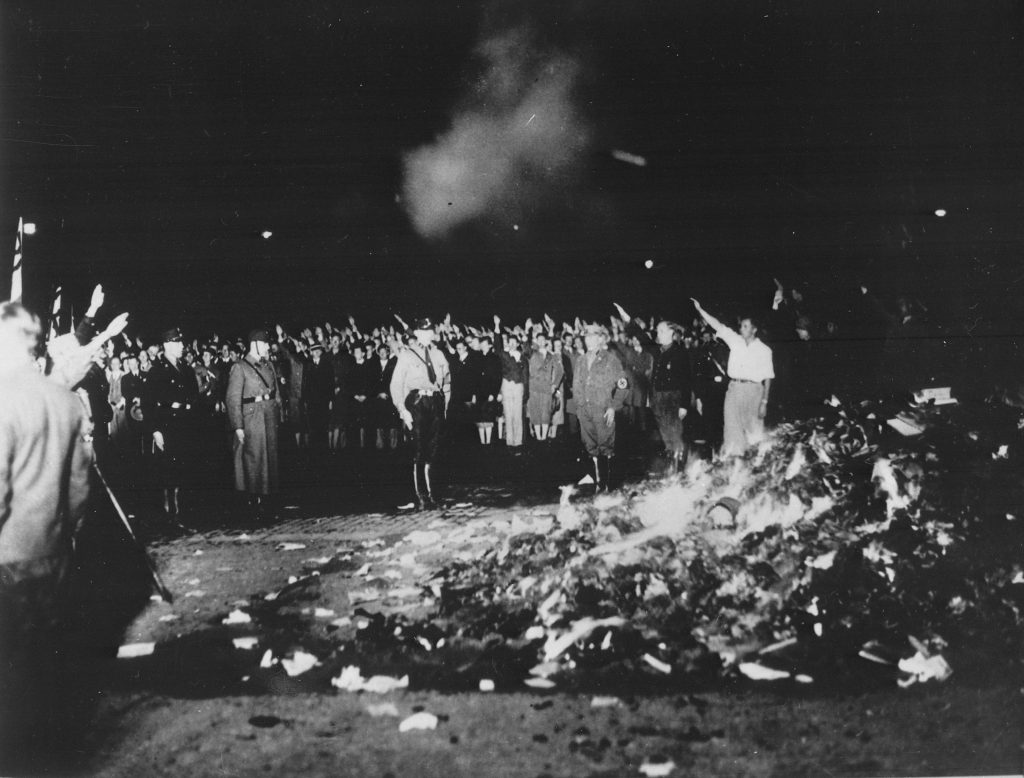
Litteratur
Se også ovenfor Klassiske tekster.
- Bookwatch: Understanding fascism. By Chris Bambery (International Socialism, Issue 63, Summer 1994, p.163-178). Review essay of the current literature about fascism.
- Fascist and anti-fascist material (Working Class Movement Library Web site)
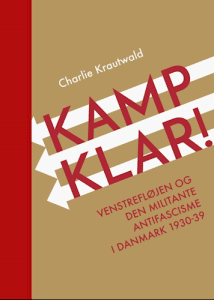
Litteratur på dansk
Antifascisme i 1930erne. Af Morten Thing (Solidaritet.dk, 31. oktober 2020). Anmeldelse af Charlie Krautwald: Kampklar! Venstrefløjen og den militante antifascisme i Danmark 1930-39 (Syddansk Universitetsforlag, 2020, 253 s.).
“… historiker Charlie Krautwald skrevet en letlæst og informativ bog, der oplyser om antifascistiske bevægelser i Danmark før 2. Verdenskrigs udbrud.”
Se også:
Gadeuorden. Af Niels Jespersen (Netavisen Pio, 17. september 2020)
Venstrefløjens kampklare militante. Af Lars Hostrup Hansen (Rød+Grøn, 28. oktober 2020)
Direkte venstre mod højre i 1930erne. Af Peter T. Christensen (SFAH, februar 2021).
Gaden er vor. Af Claus Bundgård Christensen (Weekendavisen, 11. september 2020). “… studier af 1930ernes ekstreme politiske kamp (forekommer) i stigende grad relevant for nutidens samfund.” Under betalingsmur.
Engang gik den danske venstrefløj i uniform med skrårem. Af Bent Blüdnikow (Berlingske, 26. sept. 2020). “… venstrefløjen tog også uniformer på og slog gerne politiske modstandere til plukfisk. .. spændende bog om den aktivistiske venstrefløj begynder godt, men ender i den ideologiske venstregrøft.”
** Trepile-Bevægelsen og dens stifter, tysk/russiske Sergej Tschachotin, er behandlet i bogens kapitel ‘Trepil mod hagekors’, side 79-84 og på Denstoredanske.
—–
Demaskering af fascismen. Red. af Demos Dokumentationsgruppe (Demos Debat, 2019, 83 sider) (Demos Nyhedsbrev, nr. 129/30).
Fascismen i Italien (Temanummer af Den Jyske Historiker, nr.27-28, 1984, 276 sider). Af Thorsten Borring Olesen, Niels Arne Sørensen og Uffe Østergård.
Fascismen og arbejderbevægelsen: bidrag til fascismens og antifascismens historie. Red. af Tom Bøgeskov og Bruno Svindborg (DKP-Valby, 1984, 88 sider). Med artikler af Hans Uwe Petersen, Michael Seidelin, Tom Bøgeskov, Ole Jorn, Mina Steffen Pedersen, Michael Kjeldsen og Gelius Lund.
Småborgerskab of fascisme. Red. af Karl Christian Lammers, Bent Egaa Kristensen og Mogens Rüdiger (GMT, 1977, 164 sider) (Historievidenskabs skriftrække, 11). Materiale fra et seminar, arrangeret af Kritiske Historikere april 1976. Med artikler af Eike Hennig, Carsten Jensen, Ib Thiersen og Karl Christian Lammers.
Fascismen i Tyskland (Temanummer af Politiske Arbejdstekster, nr.9, august 1976, 135 sider). Med artikler af Ralf Beckenbach (s.9-75), Herbert Dewald, Franz Neumann, Karl Korsch og Karsten Jensen.
Fascisme og kapitalisme: teorier om fascismens opståen og funktion. Red. af Ib Thiersen (Tiderne Skifter, 1975,187 sider). Med artikler af Reinhard Kühln, Hans-Jürgen Krahl, H.C. Mansilla, August Thalheimer, Johannes Agnoli, Niels Kadritzke og Ib Thiersen.
Økonomi og klassekamp i den tyske fascisme. Af Alfred Sohn-Rethel (GMT, 1975, 208 sider) (Historievidenskabs skriftrække, 1). Med efterskrift af Ib Thiersen: ‘Fascismens genesis’ (side 164-208)
Fascismen: ideologi og begreb. Red. af Jørgen Sevaldsen (Gyldendal, 1975, 78 sider) (Historie og samfund: kilder og tal)
Borgerskabet og fascismen: en undersøgelse af årsagerne til fascismens fremvækst. Af Reinhard Kühnl (Fremad, 1974, 169 sider) (Fremads samfundsvidenskabelige serie)
Hva er fascisme? Et essay om fascismens historie og sosiologi. Av Hans Fredrik Dahl (Pax, 1972, 163 sider)
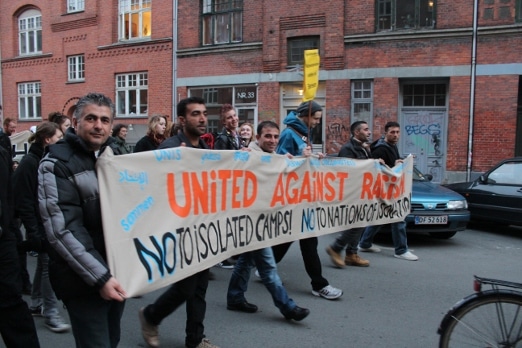
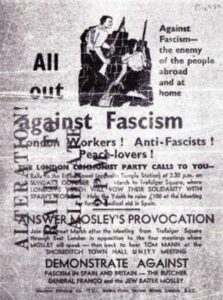
Se også på Socialistisk Bibliotek:
- Linkboxen: Bombedrabet i Søllerødgade, som bl.a. indeholder filmen “Bombemordet i Søllerødgade” og links til AFAs demonstration 16. marts 2012.
- Tidslinjen: 31. marts 2012, om demonstration i Århus mod Danish Defence League.
- Linkboxen: Auschwitz & holocaust
- Linkboxen: Nazi-Tyskland 1933-1945
- Linkboxen: 9. november – Krystalnatten 1938 og nu
- Tidslinjen 18. maj 1992 om AFA, AntifascistiskAktion.
- Tidslinjen: september 1976, om britiske Rock against Racism.
- Tidslinjen: 4. oktober 1936, om “The Battle on Cable Street” i London.
- Tidslinjen: 10. maj 1933 om, bogbrændingerne i Tyskland.
- Tidslinjen: 19. oktober 1922, om Benito Mussoli og den italiensk fascisme

































